A Golden Jubilee
Post moved to my other blog.
Framing fleeting moments and sharing humble perspectives since 2003.
Post moved to my other blog.
Posted by
changyang1230
at
8:51 PM
9
comments
![]()
Labels: Dedication, Event, Malaysia, News, Opinion, Personal, Reflection, Review
 Do you expect replies when you write a comment on a blog? Are you pissed when nobody replies to your comment?
Do you expect replies when you write a comment on a blog? Are you pissed when nobody replies to your comment?
I am not sure whether people have been pissed by me, or I am being overly sensitive. My last few posts have only seen 0, 1, 2, or 3 comments, and the last 7 chatters in the chatterbox was from myself. I feel like I was only talking to myself. :P
It probably is due to my lack of replies in the comment section, I guessed. Or people just don't have much to say about what I wrote recently, especially since I write about boring hospital routines all the time. If you thought it's boring from my writing, it is 10 times more boring in real life.
Anyway I just realized that I last answered comments in May, and since then I have been neglecting the comment sections. I just found myself some break, and I have been writing replies one-by-one to every single comment. Every single comment is now replied to! :)
So guys, if you think I owed you an answer to any of your questions, do check out the original posts. :)
Posted by
changyang1230
at
10:50 AM
11
comments
![]()
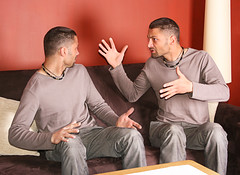 I have always wondered why people believe in the power of the magic phrase "No Offense". People who write about a controversial issue often start the writing with the magic phrase. Fanatics launch their bigotry with the magic phrase. It's thought that by saying "no offense", people who take offense at whatever that follows are themselves responsible for feeling offended.
I have always wondered why people believe in the power of the magic phrase "No Offense". People who write about a controversial issue often start the writing with the magic phrase. Fanatics launch their bigotry with the magic phrase. It's thought that by saying "no offense", people who take offense at whatever that follows are themselves responsible for feeling offended.
I see much wrong with the phrase "no offense".
Saying "no offense" does not exempt you from shouldering the consequences spawned by your words. Saying "no offense" does not turn a blatant fanaticism into a careless ignorance. Saying "no offense" before a spiteful tirade, doesn't make the tirade more tender and lovely. Saying "no offense" doesn't vindicate yourself when everything you say IS offensive. If it's offensive, it is; if it isn't, it isn't.
In my humble opinion, we should just scrap "no offense", or at least delegate its role to an interjection. It doesn't carry any weight, and people who use this phrase and reckon they are relieved of practising discretion in their words, are simply lazy.
You know what, basically, "no offense" means as much as "you know", "seriously" and "basically", seriously.
Update 27/07/07:
Anyway I might have gone too far by suggesting to drop the phrase altogether. Actually I am mostly irked by people who defend their offensive statements by claiming that "I have already said no offense, why are you angry wor..."
Click here to read more.
I guess it depends on what you mean when you say "no offense".I might be wrong, but I feel that many people mean 2 or 3 when they use the phrase. And those two usages were what I was referring to in my post.
- "I hope that you do not take offense with my words"
- "I do not intend to offend you"
- A cop-out. Or in other words, "See, I have already told you not to be offended, if you are still offended it's your own fault lehh!!"
In my opinion, usage 2, "I do not intend to offend you" doesn't mean much, because:For usage 3, I think it's pretty obvious that such defense is inadmissible. You are responsible for what you do, for example you can't expect to be acquitted of killing someone just because you said "sorry" before you do it.
- If you are aware that your words have a high chance of offending the listener but you still say it, then you are hoping for a cheap moral vindication when you say "I do not intend to offend you". It's almost like stabbing someone on the chest and say "I do not intend to hurt you too much".
- If you are not sure whether it will offend, then it would be the case of usage 1, which I think is okay.
- If you think it wouldn't offend others, then you wouldn't say it in the first place.
- If you never thought whether your words would offend others or not, then saying "I do not intend to offend" is another cheap cop-out. It's like a guy wearing a shirt which says "Whatever I do, I do not intend to affect others", and mindlessly ramble, shout, kick, jump on the street without thinking of its consequences. Would you say this guy is acquitted of his behaviours since he never thought about the consequences, and that he put a disclaimer on his shirt beforehand?
For usage 1 though, I think it's okay, but with an important condition: You should pay attention to avoiding incendiary statements before you say it.
So I am basically condemning the usage 2b and 3. However, stripped to the barebone, my point is: "No Offense" doesn't take away your responsibility over your words. Even if you say "no offense" in any circumstance, the listeners still have the right to be offended or even claim for compensation, regardless of your intention. We should still practise discretion in any case.
"I personally believe that U.S. Americans are unable to do so because some people out there in our nation don't have maps. And uh, I believe that our education, like such as in South Africa and, uh, Iraq and everywhere, like, such as... and, I believe that they should, our education over here in the U.S., should help the U.S. or should help South Africa, it should help Iraq and the Asian countries so we would be able to build up our future for our children." - Miss Teen South Carolina, Miss Teen USA 2007 CompetitionEither she is fighting a tremendous stage fright, or she is part of that 1/5 population. :P
Posted by
changyang1230
at
2:44 PM
2
comments
![]()
Labels: Video
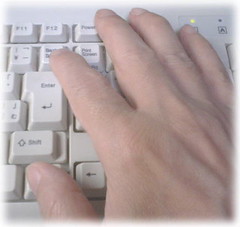 Sometimes it helps to know some useful keyboard shortcuts. There are so many cumbersome procedures which could be greatly simplified if you know the right keyboard shortcut.
Sometimes it helps to know some useful keyboard shortcuts. There are so many cumbersome procedures which could be greatly simplified if you know the right keyboard shortcut.
One of them is Ctrl-Backspace.
Ctrl-Backspace: Delete the last wordIt's excruciating to see some of my friends or tutors pressing backspace millions of times in order to edit text in Microsoft Word. I wanted to tell them about Ctrl-backspace but I always held back in the end for the fear of appearing showy.
Posted by
changyang1230
at
12:09 PM
2
comments
![]()
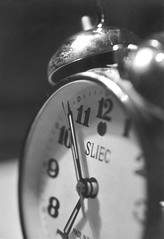 From the day I chose medicine as a career, I have always known that the road ahead would be challenging. Long working hours, stressful environment, distressing tragedies are just a few examples in the long list of adversities faced by healthcare workers. Certainly most people would reap the reward at the end of the day, but concealed from the pride and glory is the sweat and tears as they grudgingly put up a positive front to their colleagues and patients on every single day.
From the day I chose medicine as a career, I have always known that the road ahead would be challenging. Long working hours, stressful environment, distressing tragedies are just a few examples in the long list of adversities faced by healthcare workers. Certainly most people would reap the reward at the end of the day, but concealed from the pride and glory is the sweat and tears as they grudgingly put up a positive front to their colleagues and patients on every single day.
Don't get me wrong here - I am not saying that being a doctor is a bad job. In fact I have been exaggerating the hardship here for the sake of drama. For the past few weeks, watching surgeries, appreciating the marvel of technologies, learning new stuff, talking to doctors, seeing real alive patients (yes you hear it right) have been some of the most rewarding moments since I entered medical school. At the end of each day, Xuan Ni and I usually exchange our daily experiences and stories while walking home along Grattan Street, and that have been been thoroughly enjoyable. We commiserated with the unfortunate cancer patients, tipped off each other about cute doctors, and assuaged each other's complaints as we shuffled home tiredly. And that, I must say, is the highlight of my days.
But still, everything came earlier than expected.
I knew that the future that awaits me are the 36-hour shifts, endless walking in the hospital and breathing in medicine-scented air. But I never knew that busy days have begun to take its toll on me, and such schedules will probably remain until I retire in the unforeseeable future.
I knew that at some point in my life, I will no longer have the freedom of surfing online until the wee hours in the morning - but I didn't know that in order to wake up at 7 everyday, I have already been robbed of that freedom in the third year of medicine.
I knew that I have been living an obscenely slack lifestyle throughout the years, and that it ought to be substituted by the harsh medicinal lifestyle. But I didn't know how a research student's lifestyle could be so much more demanding than the lifestyle of a pre-clinical medical student.
Probably I never knew well enough.
I never knew how lazy I have been for the past 21 years, that even a mildly disciplined lifestyle seems like a punishment to me.
I never empathized enough when my architecture friends complain about sleep-deprivation. Until I begin to sleep less than six hours everyday.
I never knew I am not as adaptable as I thought. When it arrived earlier than expected, I flounder. But I will move on toughly. The only way to go through a hardship, is to move on.
Posted by
changyang1230
at
7:10 PM
5
comments
![]()
Labels: Education, Hospital, Medicine, Melbourne, Personal, Rambling, Reflection, Review
Top scientists agree: "With the present rate of human consumption, the earth's supply of gravity will be exhausted before the 24th century."
Posted by
changyang1230
at
8:39 PM
0
comments
![]()
From: CNN.com(CNN) -- "Two minutes!" yells our course coordinator.
Medical student Emily Breidbart joins her anatomy lab partner, Jonathan Adelstein, on the last day of class.
Her voice startles me as I try to concentrate on Mrs. Chin's account of her recent asthma attacks.
I have already used eight of 10 allotted minutes, and now have to wrap up my "Objective Structured Clinical Examination."
During our four years as medical students, we will do dozens of these OSCEs -- imaginary, but realistic doctor-patient scenarios.
My professor praises that I structured my 10 minutes well. I'm pleased. In our first year, we simply take a medical history. But next year, I'll add a physical examination, and in my third year, I'll be adding counseling and treatment into the "patient visit." And all we get is five more minutes added onto our OSCE time. How can I get all of this done in just 15 minutes?
Learning how to practice medicine on this sort of a time-scale is stressful. But it's totally necessary in order to properly train us for a world of health care in which the average physician visit is six minutes! When our professors went to medical school, they were taught the art of healing; we are taught how to diagnose and treat patients in a limited timeframe. I can't help but think, is this what I signed up for?
My father is a pulmonologist and the head of an eight-doctor practice on Long Island. When I tell people this, many say, "Oh, he must have really wanted you to follow in his footsteps!" But actually, he made me very wary of medicine. He is tired of spending half of his energy dealing with insurance companies. Energy and time, he says, that would be better spent on his patients, time he had when he first started practicing in a health-care era in which doctors didn't need to justify prescriptions and tests to insurance companies. He still insists on giving ample time to his patients, but now has to work incredibly long hours to do so.
At my dad's 50th birthday party, when I was 19, his colleagues interrogated me about my recent decision to pursue medicine.
Are you sure you really want to do this?
Why put yourself through all the years of stress? You're a smart girl -- how about journalism, law, business...?
Your dad couldn't convince you not to do this? I'll have to have a talk with him!
How is it that my classmates and I are going into medicine if this is what people who have lived our future are saying?
We start out in medical school as idealists. We thirst for clinical experience. We want to explore all of our options, and help those who can't afford health care. But somewhere along the line, we start taking off our rose-colored glasses. I've seen it happen already with some classmates after only one year of school. We know that it is surgeries and procedures that are financially rewarded. Insurance companies reimburse very little for routine examinations. So although we might really be interested in primary care or pediatrics, after hundreds of thousands of dollars of debt (my school estimates that each year, tuition, housing and expenses will cost about $55,000), many of us feel pressured to go into a specialty field that will ensure we can pay back our loans. Our dreams and good intentions have to be put aside.
And then there are fields like OB-GYN, which a lot of my colleagues have already ruled out because of the high cost of malpractice insurance.
We are taught about malpractice from Day 1. I remember countless times in the anatomy lab when we were digging for arteries and nerves, our teachers saying, "Now if you cut this in real life, you would be sued," phrased in terms of a legal consequence instead of the repercussion that the patient might die.
This "art of defensive medicine" infiltrates the classroom too. We are taught how to ask questions of our patients and treat them in such a way that minimizes our risk of a lawsuit. We are trained what kind of patients to be wary of. Basically, we are taught that we can't trust our future patients, which is confusing to first-year medical students. How can we expect our patients to trust us if we can't trust them?
Yet, after all this, I'm truly excited to be a doctor. Medical science and technology are booming and there will be so many ways in which we can help our patients. I want to go into pediatrics, and can see nothing more rewarding then helping sick children. And I can't blame the medical school curriculum; it is only preparing us for a reality. It is my hope however, that in my lifetime, our health-care system will change in such a way that lets us go back to simply learning the art of healing.
Anyway, speaking about statistics, it's funny if you realize what most medical researches are about. What most journal articles will give you a result like this:Three statisticians and three epidemiologists are traveling by train to a conference. The statisticians ask the epidemiologists whether they have bought tickets. They have.
“Fools!”, say the statisticians. “We've only bought one between us!”
When the ticket inspector appears, the statisticians hide together in the toilet. The inspector knocks and they pass the ticket under the door. He clips the ticket and slides it back under the door to the statisticians.
The epidemiologists are very impressed, and resolve to adopt this technique themselves. On the return they purchase one ticket between them, and share the journey with the statisticians, who again ask whether they've all bought tickets. “No”, they reply, “we've bought one to share.”
“Fools!”, say the statisticians, “we've not bought any.”
“But what will you do when the inspector comes?”
“You'll see.”
This time when the inspector appears, the epidemiologists hide together in the toilet. The statisticians walk up to door and knock on it. The epidemiologists slide their ticket under the door, and the statisticians take it and use it as before- leaving the epidemiologists to be caught by the inspector.
The moral of this story is that you should never use a statistical technique unless you are completely familiar with it.
Retold by Frank Shann in The Lancet 1996; 348: 1392
We are 95% confident that people on average will be about 1.5 - 2.1 times more likely to have accidents if they have obstructive sleep apnoea.And that's all we are proud of, a double layers of probability. I'm not saying that statistics are bull shit; it's just that with bad curriculum in this subject, most healthcare providers are unfamiliar with it. That makes it easier for those in the know to manipulate it, possibly to the detriment of the patient's welfare.
Posted by
changyang1230
at
10:27 PM
3
comments
![]()
Labels: Education, Mathematics, Medicine
A child: Mum, I'm full. We can't really take away the remaining burger. So can I throw it away?
His mum: Hey, finish your burger, don't waste it! Do you know how many Ethiopians are starving to death? You mustn't be so wasteful!
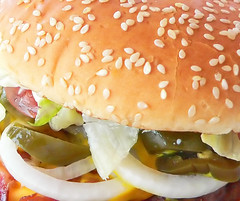 Everyday we make a lot of decisions. We decide whether to have a short rest in the afternoon, whether to tell the cute guy that his zipper is undone, and whether to finish our homework before playing a new Wii game. In the decision making process, we justify our actions based on a set of personal moral principles.
Everyday we make a lot of decisions. We decide whether to have a short rest in the afternoon, whether to tell the cute guy that his zipper is undone, and whether to finish our homework before playing a new Wii game. In the decision making process, we justify our actions based on a set of personal moral principles.Lying is wrong, so I must not tell lies. Not even white lies.
Telling the truth is the right thing to do - therefore I must tell the truth even if it incites anger and hatred.Such stands are obviously contentious and are no longer universally accepted. What's right for a person might be hurtful for another. Being highly-principled might not be good after all.
Posted by
changyang1230
at
8:09 PM
7
comments
![]()
Click F11 for full screen, then go here:
Link (Tips: It follows your mouse cursor!)
Nothing scary there. Just creepy. Leave it on your office computer, and scare the hell out of passing colleagues. :P (Also, she will NOT crawl out of your monitor!)
Posted by
changyang1230
at
7:39 PM
2
comments
![]()
I was listening to Chinese songs in 1ting.com (which I strongly recommend for online streaming Chinese songs) when I stumbled upon an old classic, 明天会更好. I am sure every single Chinese must have heard of this song before, but I reckon that like myself, a lot of people in my generation do not know much about the charity song recorded in 1985. Produced around the same time as my birth date, the song featured the greatest singing talents of the era including 蔡琴、苏芮、潘越云、甄妮、黄莺莺、陈淑桦、齐豫、张艾嘉、张清芳、蓝心湄 、余天、费玉清、齐秦、巫启贤、李宗盛、童安格 among others. It was said to be inspired by the US all-star charity song "we are the world", another classic which raised hundreds of million dollars for the 84-85 Ethiopian famine.
Round about 2003, at the peak of the SARS global epidemic, dozens of singers again came together in Taiwan and produced "手牵手", a touching song which called for courage and resolution in the combat of the deadly disease.
Listening to those songs, I can't help but to be amazed by the veteran artists' voices and the power of music in conveying public messages. Sometimes I wonder why our artists don't put up more of such efforts - if I were a singer, being involved with such communal efforts would be one of the most proudest thing I could ever do in my life. Being involved in such charity efforts would mean much more than almost everything else an artist does, combined.
Here, I shall just end this brief post by sharing the three aforementioned songs:
明天会更好: Lyrics
手牵手: Lyrics
We are the world: Lyrics
Posted by
changyang1230
at
11:24 PM
7
comments
![]()
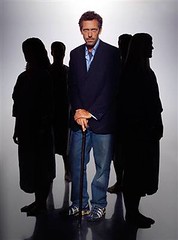 As the most junior member in the depressive, towering hierarchy of medicine, a medical student spends quite a lot of time following a doctor in the hospital. That's what I do quite often for the past few weeks while waiting for my research to kick start some time in the near future.
As the most junior member in the depressive, towering hierarchy of medicine, a medical student spends quite a lot of time following a doctor in the hospital. That's what I do quite often for the past few weeks while waiting for my research to kick start some time in the near future.
Some people feel that the term "following a doctor" doesn't sound quite professional. In fact it sounds rather oppressed, some would say. You know, it paints the stark picture of a docile junior obeying the seniors' command, being prepared to stomach any potential bad treatments, feeling stupid etc. So to cheer things up a bit, we don't say we "follow a doctor" anymore; "shadowing a doctor" is the jargon we use to glorify the routine.
It's funny how fancy words are enjoyed by the medical people. In the dictionary, the closest meaning of shadow to this word usage is:
verb - follow, usually without the person's knowledge; "The police are shadowing her"Not quite close in meaning, isn't it?
Posted by
changyang1230
at
6:52 PM
6
comments
![]()
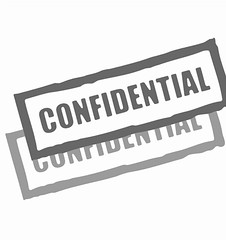 I hate confidentiality.
I hate confidentiality.
No, I don't mean I disrespect or disregard the value of confidentiality. What I mean is, I hate having to keep a secret.
Some people are good at keeping secrets. Some people even enjoy keeping secrets - they are proud that they are being great confidants, and that they hold the key to the secret corner of many a heart. Derived from this is a sense of importance which confers immense emotional gratification in many people.
Despite all that, I hate to keep a secret.
It's not like I am not a nosey person (I am); but after knowing some secrets, it's really hard to pretend that I don't know about it. You see, the love of sharing flows in my vein - I love to share things like stories, knowledge, tips etc - but keeping a secret is the very opposite of what I love to do. Keeping things to myself is painful. I still keep secrets though, but it is excruciating.
Today, I am starting to feel the challenge I face as I am more exposed to the clinical environment. All patients' identities are to be kept strictly confidential. I can't tell you about the identity of any single patient, regardless of how interesting they are.
For example, today I saw an interesting guy who used to work for an international bigwig; but heck, I can't tell you more lest you find out that this particular guy has done a colonoscopy today. The only things I can tell you are:
A 70-year-old man came in for a colonoscopy procedure, and the investigation showed that he had a normal bowel.That sucks (for me).
Posted by
changyang1230
at
6:12 PM
7
comments
![]()
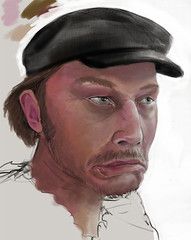 Update 09/08/07: Here.
Update 09/08/07: Here.
Today is quite like other AMS working days, but unlike other peaceful times, today was marked by a little dose of WTF moment.
The story goes like this: Our supervisor wanted us to shadow (= tag along) an anaesthetist, and after some arrangement he decided to take me to an anaesthetist (call him Z) who's doing anaesthesia for endoscopy procedure. While the supervisor was bringing me to the procedure room, we met Z who's leaving the endoscopy area. My supervisor asked Z whether it's alright if I shadow him, and he said fine, and he would be back soon. The supervisor told me to wait at the procedure area, as Z will be back in a second.
So I waited there. Standing has become a routine for me for the past few weeks. I stand most of the time when I am in hospital watching surgeries and other stuff. At times I feel stupid as I can't do much in the hospital. We do so much waiting all the time, most of the time waiting for someone to come back while we are left hanging around, not being told what to do or expect, simply being useless. While I am waiting, I could just stare at a blank space, or sometimes I take out my PDA to do some brief reading.
After 5 to 10 minutes of waiting, he's not back and I had a call from nature (which happens quite often to my for some reasons). So I went to the washroom, quickly finished my business, and went back to wait. After some 5 to 10 minutes again, I decided that it was too long a wait, and I did what everyone would do - I asked a doctor at the receptionist area. The doctor told me that Z is already in the procedure room, and I can just go in there.
Me: Dr. Z?And he almost ignored me throughout the whole 2-hour session. He just talked to me twice.
Z: Oh hi! *walk towards him, who's prepping up the patient for the endoscopy*
Me: Is there anything I could help?
Z: You are late.
Me: I waited for you outside but you weren't back. Then I went to the toilet and waited again. You might have come back when I was in the toilet. (Can't really remember whether I said sorry at this point, but I did say sorry once at one point in this conversation)
Z: No I do not accept this excuse. This is a really bad excuse.
Me: Really I was outside... (I might have said sorry at this point. Again I am not sure)
Z: You could have come in and looked for me. Really if you don't want to be here you don't have to.
Me: I want to be here.
(Can't really remember what we said after that. The conversation stopped around that point.)

This is not the end. It is not even the beginning of the end. But it is, perhaps, the end of the beginning - Winston Churchill
9 comments:
Post a Comment